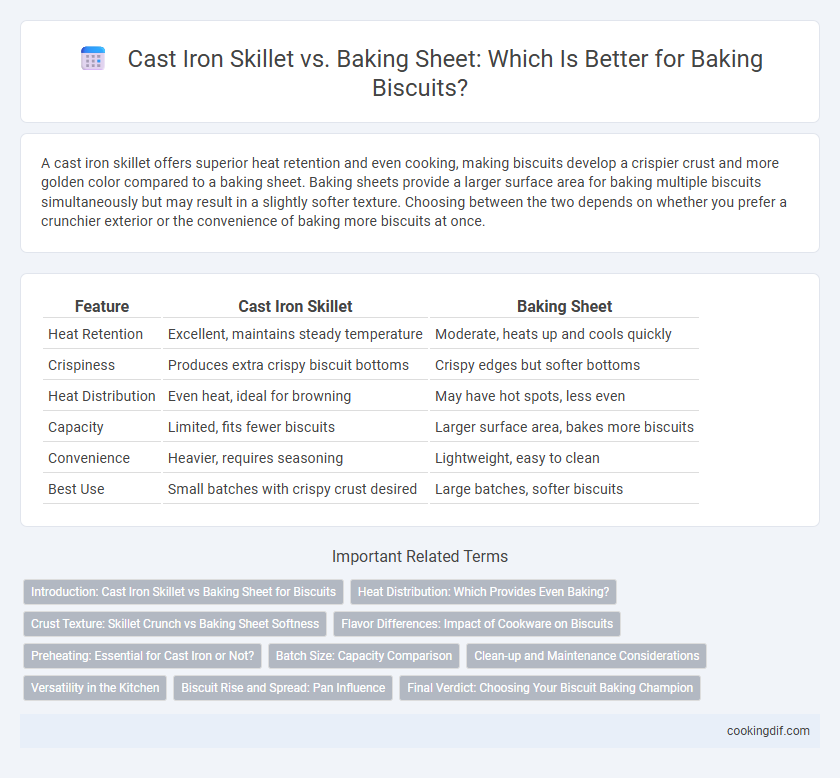A cast iron skillet offers superior heat retention and even cooking, making biscuits develop a crispier crust and more golden color compared to a baking sheet. Baking sheets provide a larger surface area for baking multiple biscuits simultaneously but may result in a slightly softer texture. Choosing between the two depends on whether you prefer a crunchier exterior or the convenience of baking more biscuits at once.
Table of Comparison
| Feature | Cast Iron Skillet | Baking Sheet |
|---|---|---|
| Heat Retention | Excellent, maintains steady temperature | Moderate, heats up and cools quickly |
| Crispiness | Produces extra crispy biscuit bottoms | Crispy edges but softer bottoms |
| Heat Distribution | Even heat, ideal for browning | May have hot spots, less even |
| Capacity | Limited, fits fewer biscuits | Larger surface area, bakes more biscuits |
| Convenience | Heavier, requires seasoning | Lightweight, easy to clean |
| Best Use | Small batches with crispy crust desired | Large batches, softer biscuits |
Introduction: Cast Iron Skillet vs Baking Sheet for Biscuits
Cast iron skillets provide superior heat retention and even cooking, resulting in biscuits with a golden, crispy crust and tender interior. Baking sheets offer a flat surface ideal for uniform biscuit shaping but may produce less consistent browning. Choosing between a cast iron skillet and a baking sheet impacts texture, browning, and overall biscuit quality.
Heat Distribution: Which Provides Even Baking?
Cast iron skillets excel in heat retention and even distribution, ensuring biscuits develop a consistent golden crust. Baking sheets offer quicker heat transfer but may result in less uniform browning due to thinner metal construction. For optimal biscuit baking, cast iron skillets provide more even heating, reducing hot spots and promoting uniform rise and texture.
Crust Texture: Skillet Crunch vs Baking Sheet Softness
Cast iron skillets create a distinctive crunchy crust on biscuits due to their high heat retention and even heat distribution, promoting Maillard reaction and caramelization. Baking sheets tend to yield softer crusts as heat is less concentrated, producing a gentler bake with less crispness. Choosing cast iron enhances texture contrast, delivering a biscuit with a crisp exterior and tender, fluffy interior.
Flavor Differences: Impact of Cookware on Biscuits
Cast iron skillets enhance biscuit flavor by providing even heat distribution and superior heat retention, resulting in a crispier crust and richer, caramelized notes. Baking sheets produce a lighter, more evenly browned biscuit without the intense crust development characteristic of cast iron. The choice of cookware directly influences texture and depth of flavor, with cast iron intensifying buttery, toasted qualities.
Preheating: Essential for Cast Iron or Not?
Preheating is essential for cast iron skillets when baking biscuits to ensure even heat distribution and a crispy crust. Baking sheets, made from thinner metal, heat up quickly and don't require as long to preheat, but cast iron's heat retention vastly improves biscuit texture. For best results, preheat cast iron skillets for at least 10-15 minutes, which enhances browning and prevents sticking.
Batch Size: Capacity Comparison
A cast iron skillet typically holds fewer biscuits per batch compared to a standard baking sheet due to its smaller surface area and higher sides, which concentrate heat for even cooking. Baking sheets provide a larger, flat surface that accommodates more biscuits, allowing for bigger batch sizes and efficient oven space utilization. Choosing between the two depends on whether batch quantity or heat retention for consistent biscuit texture is the priority.
Clean-up and Maintenance Considerations
Cast iron skillets require thorough seasoning and careful cleaning to maintain their non-stick surface and prevent rust, making clean-up more labor-intensive compared to baking sheets. Baking sheets, typically made of aluminum or stainless steel, are easier to clean as they usually only need simple washing and occasional replacement when warped or scratched. Proper maintenance of cast iron involves drying immediately after washing and applying a thin layer of oil, while baking sheets generally do not require special treatment beyond regular cleaning.
Versatility in the Kitchen
A cast iron skillet offers superior heat retention and even cooking, making it ideal for creating biscuits with a perfectly crisp crust and tender interior. Baking sheets provide a larger surface area for baking multiple biscuits simultaneously, ensuring consistent airflow and even browning. Choosing between the two depends on whether versatility in heat management or batch size is prioritized in your kitchen setup.
Biscuit Rise and Spread: Pan Influence
A cast iron skillet promotes superior biscuit rise and less spread due to its excellent heat retention and even cooking surface, which creates a crispy outer crust while maintaining a soft, fluffy interior. In contrast, baking sheets tend to result in more spread biscuits because of thinner metal and faster heat dissipation, leading to uneven expansion. The skillet's ability to hold high heat contributes to better oven spring, enhancing biscuit texture and height.
Final Verdict: Choosing Your Biscuit Baking Champion
A cast iron skillet delivers superior heat retention and even browning, producing biscuits with a perfectly crispy crust and tender interior, while a baking sheet offers convenience and faster baking times with a lighter crust texture. For biscuit enthusiasts seeking a rustic, bakery-quality finish, the cast iron skillet stands as the ultimate choice, elevating flavor depth and crumb structure. Home bakers prioritizing ease and speed may prefer the baking sheet, yet true biscuit champions consistently favor the cast iron skillet for unmatched results.
Cast iron skillet vs baking sheet for baking Infographic

 cookingdif.com
cookingdif.com